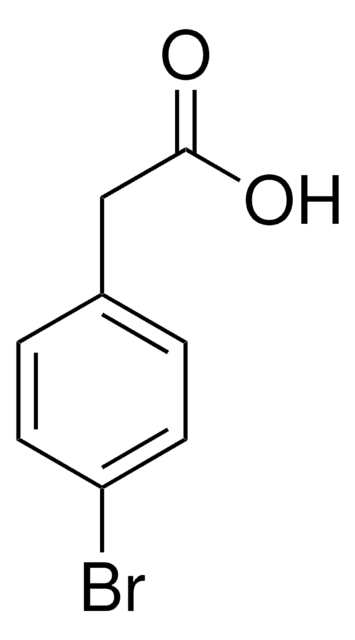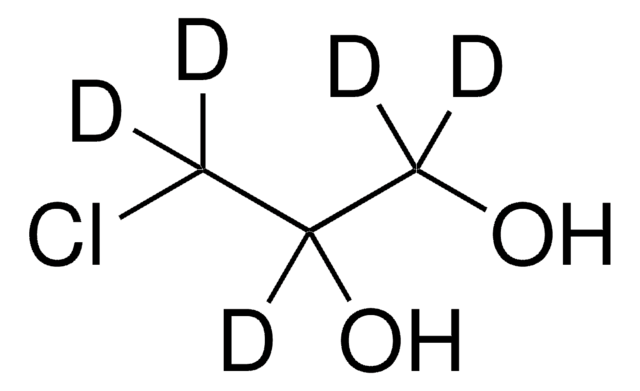78181
Phenylboronic acid
purum, ≥97.0% (HPLC)
Synonym(s):
Benzeneboronic acid, Dihydroxyphenylborane, NSC 66487, Phenyl-boric acid, Phenylboric acid, Phenyldihydroxyborane
Sign Into View Organizational & Contract Pricing
All Photos(4)
About This Item
Linear Formula:
C6H5B(OH)2
CAS Number:
Molecular Weight:
121.93
Beilstein:
970972
EC Number:
MDL number:
UNSPSC Code:
12352103
PubChem Substance ID:
NACRES:
NA.22
Recommended Products
grade
purum
Quality Level
Assay
≥97.0% (HPLC)
form
crystals
mp
216-219 °C (lit.)
218-222 °C
SMILES string
OB(O)c1ccccc1
InChI
1S/C6H7BO2/c8-7(9)6-4-2-1-3-5-6/h1-5,8-9H
InChI key
HXITXNWTGFUOAU-UHFFFAOYSA-N
Looking for similar products? Visit Product Comparison Guide
General description
Phenylboronic acid is a highly stable receptor ligand used in cross-coupling reactions and drug delivery.
Phenylboronic acid (PBA) is an organoboronic acid. It behaves as a molecular receptor that can attach to compounds containing cis-diol group. Microwave-assisted Suzuki coupling of aryl chlorides with phenylboronic acid in the presence of Pd/C (catalyst) and water (solvent) has been described. Palladium-catalyzed cross-coupling reaction of phenylboronicacid with haloarenes to afford biaryls has been reported.
Phenylboronic acid (PBA) is an organoboronic acid. It behaves as a molecular receptor that can attach to compounds containing cis-diol group. Microwave-assisted Suzuki coupling of aryl chlorides with phenylboronic acid in the presence of Pd/C (catalyst) and water (solvent) has been described. Palladium-catalyzed cross-coupling reaction of phenylboronicacid with haloarenes to afford biaryls has been reported.
Application
Phenylboronic acid may be employed in the following reactions:
Phenylboronic acid may be employed as reagent in the preparation of:
- Rhodium-catalyzed intramolecular amination.
- Pd-catalyzed direct arylation.
- Mizoroki-Heck and Suzuki-Miyaura coupling reactions catalyzed by palladium nanoparticles.
- Palladium-catalyzed stereoselective Heck-type reaction.
- Highly effective Palladium-catalyzed arylation Suzuki-Miyaura cross-coupling in water.
Phenylboronic acid may be employed as reagent in the preparation of:
- Ni(II) pincer complex and Pd(II) pyridoxal hydrazone metallacycles as catalysts for the Suzuki-Miyaura cross-coupling reactions.
- N-type polymers for all-polymer solar cells.
- Novel series of potent and selective mTOR kinase inhibitors.
- Inhibitors of lactate dehydrogenase against cancer cell proliferation.
Other Notes
Contains varying amounts of phenylboronic anhydride
Signal Word
Warning
Hazard Statements
Precautionary Statements
Hazard Classifications
Acute Tox. 4 Oral
Storage Class Code
11 - Combustible Solids
WGK
WGK 3
Flash Point(F)
Not applicable
Flash Point(C)
Not applicable
Personal Protective Equipment
dust mask type N95 (US), Eyeshields, Gloves
Choose from one of the most recent versions:
Already Own This Product?
Find documentation for the products that you have recently purchased in the Document Library.
Customers Also Viewed
Synthesis of polyfunctional glycerol esters: lipase-catalyzed esterification of glycerol with diesters.
Villeneuve P, et al.
Journal of the American Oil Chemists' Society, 75(11), 1545-1549 (1998)
Phenylboronic-acid-based functional chemical materials for fluorescence imaging and tumor therapy
Li S, et al.
ACS Omega, 7, 2520-2532 (2022)
Riina K Arvela et al.
Organic letters, 7(11), 2101-2104 (2005-05-20)
[reaction: see text]. We present here a methodology for the Suzuki coupling of aryl chlorides with phenylboronic acid using Pd/C as a catalyst, water as a solvent, and microwave heating. We show that simultaneous cooling in conjunction with microwave heating
Peng-Cheng Chen et al.
Langmuir : the ACS journal of surfaces and colloids, 27(20), 12597-12605 (2011-09-09)
Phenylboronic acid (PBA)-functionalized materials have attracted considerable attention because of their potential applications in many fields. In this paper, we report a PBA-segregated honeycomb-patterned porous film (HPPF) for glucose sensing. Polystyrene-block-poly(acrylic acid-co-acrylamidophenylboronic acid) with different contents of PBA pendants was
Ni(II)-POCOP pincer compound [NiCl{C10H5-2,10-(OPPh2)2}] an efficient and robust nickel catalyst for the Suzuki-Miyaura coupling reactions
Estudiante-Negrete, F.; Hernandez-Ortega, S.; Morales-Morales, D.
Inorgorganica Chimica Acta, 387, 58-63 (2012)
Our team of scientists has experience in all areas of research including Life Science, Material Science, Chemical Synthesis, Chromatography, Analytical and many others.
Contact Technical Service















